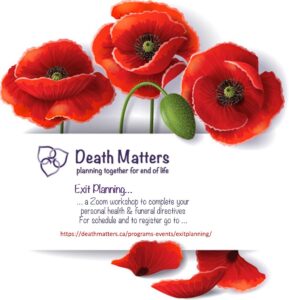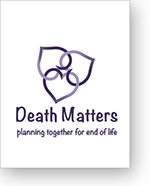
The Exit Planning workshop series offers three guided meetings during which you will have the opportunity to explore, document, discuss and make decisions about end-of-life care. The documents you create will provide peace of mind in the event of your illness and/or death.
- Advance Directives: what kind of measures do you want taken to keep you alive (or not)
- Substitute Decision Maker: who will speak for you if and when you are unable
- Funeral Planning: care of your body, funeral ceremony, disposition, and more.
Next in-person workshop: TBD
ZOOM schedule (Atlantic time)… (to determine your own time zone go to https://www.worldtimebuddy.com/)
-
TBD
Cost: Full group series,
- ZOOM price $120
- Regular price $150; $250 per couple
- Patron price $180 (allows us to provide scholarships)
- $75 for one session
- Generosity policy available
- $50 per hour for private consultation.
And if you are dying to repeat the workshop, the cost is half as much!
Please note: Due to program pre-homework registration closes 7 days prior to first meeting. For more information, to register, or to schedule a workshop in your community, please contact us.
It is the right time to contemplate and prepare for death.
 Purchase Exit Planning Workbook
Purchase Exit Planning Workbook
Been putting off your end-of-life paperwork? Finding it difficult to know where to begin? The EXIT PLANNING Workbook provides a path to completion. Download it now. And get on with your life!
PDF with fillable fields, 56 pages. $24.00. • Click here to purchase.
From a past participants….
MARY SCHROEDER recommends Death Matters NYC April 2022
Thank you so much for your most informative, thought-provoking and helpful class! I very much appreciate it!
Colleen Dahlby recommends Death Matters. April 2021
I am very thankful to have taken part in your recent Exit Planning series. I enjoyed it immensely and found the material to be most relevant. The seminars were skillfully and compassionately led by the two of you and you have provided me with all the resources I need to complete my Personal Directives and to carefully plan for my end of life.
Seth Levinson recommends Death Matters.
Savayda Jarone recommends Death Matters.
Sharon Davis recommends Death Matters.
Dawn and Deborah were fantastic. The Exit Planning course was very well done. It seemed overwhelming at first but I was able to get my directive done. I feel great knowing that my loved ones will not have to make any decisions for me when I cannot. Thanks Dawn Carson and deborah. If you are on the fence about taking this course just DO IT now!
“I took this workshop two years ago.
I was able to complete my Personal Directive by deeply considering all the aspects of my personal care should I not be able to express them myself. As well, I was able to provide my Substitute Decision Maker with very detailed instructions that went far beyond what is required by the Personal Directive of Nova Scotia and met with her to review these instructions
The End of Life Death Matters folder on my desk (and on Google Drive) also includes a hand-off memo with everything needed to close down my personal and business life, as well as documents such as contacts and tasks I wish to complete before I die. The templates, instructions and discussions were invaluable in completing these documents.
The Exit Planning workshop and further discussions with the facilitators also helped me decide what to do with my former body upon death.
The workshop was, and continues to be, invaluable in planning for the realities of this life and death. If you do not do this, you are placing a great burden on those left behind to clean up what was your life.”
Why doing your Advance Personal Health Care Directive is important.
Planning for the future is important. Everyone needs to have an Advance Directive. We may lose our physical capability temporarily or permanently. We may lose our mental capability slowly, such as with Alzheimer’s disease, or very suddenly, as a result of a car accident. Stress among patients and their loved ones often stems from disagreements regarding health care decision-making at the end of life, including the choice of when to use or stop use of life-sustaining medical procedures.
Generally, the choices regarding medical care are within a patient’s control. However, it is important to realize that there may come a time when you will not have the ability to make these decisions yourself, due to medical reasons or otherwise. Preparing an Advance Personal Directive gives you a voice in the care you will receive if you cannot make your own decisions at the time. It also helps those who will have to make personal care decisions for you. It may be the best gift you can give to your loved ones who may have to make difficult decisions for you in the future. It is important to talk about these issues with the people you trust—your family, friends, health care providers and spiritual advisors. Consider whom you would want to make decisions for you if you are not capable (temporarily or permanently) to make them yourself. Filling out an Advance Directive can be a way of sorting out your values, fears, hopes and wishes about how you want to live. It may take some time and help from others but it can be a very positive journey.
The Personal Directives Act is a new law that does three things:
It recognizes an Advance Directive as a legal document. An Advance Personal Health Care Directive allows you to set out how personal care decisions, including health care decisions, are to be made for you when you are not mentally capable of making those decisions. It is only in effect when you are alive and mentally incapable of speaking for yourself.
It sets up a process that allows a person to appoint a substitute decision maker to make decisions about their own health care. A substitute decision maker is a person who has the authority to make decisions for you if you are not able to make decisions about your own health care. If you make an Advance Directive, you can name another person as a substitute decision maker to make decisions for you about your personal care.
It allows a person to set out their wishes for their personal care in a legal document. First, you can write down specific instructions for people to follow when they provide you with personal care services, if you become incapable of making decisions. If these instructions are clear, and specific to the decision to be made, they must be followed. Second, you can write down other information about your values, beliefs, and wishes to guide others who will be providing you with personal care services, if you become incapable of making decisions.